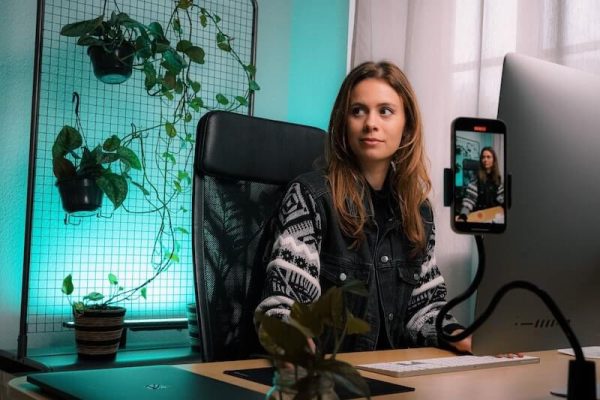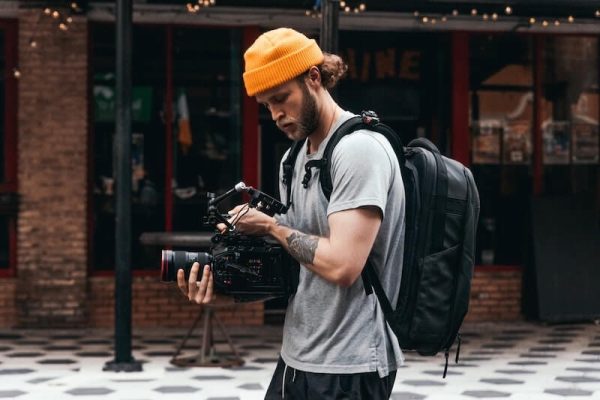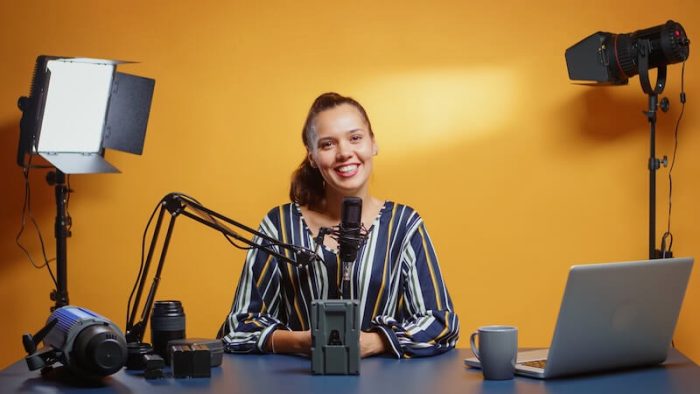We all remember that cringe video of Gal Gadot and other tone-deaf celebrities singing John Lennon’s Imagine from their mansions during the early days of lockdown.
Cases like that just prove that not everything on the internet counts as content creation, even if it is made by professional actors. So, what is content creation?
Content creators are just that — they create content. Content counts as anything. Content creators can be writers, video-makers, camera operators, sound designers, and musicians. If you create something, you’re a content creator.
But when we talk about the creator economy, we’re narrowing down the definition a bit. The creator economy refers to creators who monetize their content through online platforms — mostly social media. While the first image of an online content creator that pops into your head could be video creators, the range of content creation in the creator economy is massive.
Here are only some of the roles that work in the creator economy:
- Brand Analyst: These people evaluate and optimize brands and their tone and voice, design style, strengths, weaknesses, competitors’ strategies, and potential strategies that can pull the most value from their brand voice.
- Project Manager: As a content creator, you have to manage different projects at the same time across various disciplines. The skillset of a project manager will help you become a better creator.
- Copywriter: Knowing how to writing engaging copy in the form of captions, descriptions, and titles is essential to get your content seen
- Researcher: No matter your content, you’re going to have to do some form of research, whether that be about your audience, your content, or the platform you’re posting your content on.
- Designer: A picture speaks a thousand words, which is just one of the many reasons designers are important. Elements like thumbnails can make or break the success of your content.
- Video Editor: Video editors encompass many jobs into one, and often take on the roles of sound designers and music composers. Editing is its own art, and is essential to creating your signature style.
- SEO Specialist: Search Engine Optimization, or SEO, is one of the most neglected parts of content creation, which is a pity because it’s also one of the most important. The thing is, people just don’t understand how it works but if you do it right, SEO is what gets your content seen. Get your SEO right and your content will be there when your audience searches for it.
The creator economy is a living industry seeing massive growth at the moment and, like any other thriving industry, there are many parts of it that push it forward. As technology develops, new jobs are being created all the time, with crypto and Web3 being one of the latest developments. New creators are arriving all the time, with NFTs being one of the very latest industries to be created.
At their core, content creators are artists and CEOs of their own brand. When you start out as a creator, it’s very likely that you’ll be doing all of the jobs mentioned above… all on your own. As you begin to establish yourself, you can expand your team until you have all of these roles filled by specialists.

There are three main options to becoming a content creator: freelance, in-house, or agency. All three of these paths have their own set of pros and cons, and it’s ultimately up to you to decide which you’d like to pursue.
Freelance
Freelancers find their own flow of work, which can be stressful but offers more freedom than other paths. A freelancer strategy can work — many freelance content creators have seen success. Freelancers often do much of the work involved in content creation, but it’s a great option for those who want more control over their creative work.
In-House
In-house creatives work for one company and (usually) one industry. Pick an industry you love and you’ll do well. In-house work comes with a more stable income and benefits, and is an alternative to freelancing for those who don’t want to spend their lives hustling for a job.
Agency
Creative agencies are notorious for their fast-paced work culture, but you’ll get the advantage of working on many different kinds of projects that freelance gigs offer, along with the stable income and benefits of being in-house. If you thrive in high pressure environments, consider giving agencies a go and see how you do.
How to Become a Content Creator
Educate yourself
When you’re in school, your teachers make you think the only job you can do with a writing degree is “struggling, starving novelist”. Which is very untrue! There are tons of great careers for graduates of journalism, marketing, and even English.
You don’t need a film degree to become a content creator, but it’s highly recommended that you do upskill yourself in the basics, at least. Anyone can post content on social media, but a little know-how will be hugely beneficial to anyone looking to break into content creation.
Many online courses offer certificates that you can add to your resume. Try to find courses that have a practical element with a tangible output, like creating a video. This gives you something to add to your portfolio, which is the all-important record of the work you’ve created. Getting work to create work for your portfolio is a nightmare without one, and signing onto a course is a great way to solve that dilemma!

Find your niche
Pick a topic that interests you — and stick to it. Whether that be vlogging, creating videos about a particular topic, or a format. No matter how brilliant your content is, you’re never going to appeal to everyone on the internet… and you’ll appeal to even fewer by trying to make your content too general.
Embrace failure
No one gets everything perfect. You’re going to mess up more than once on your creator journey. More important than never messing up is learning from your failure, and seeing it as an opportunity to learn, rather than the end of the road.
The only way you truly fail is if you give up. So, brush yourself off and keep going!
Create your brand
As mentioned before, as a creator, you’re the CEO of a business, especially if you’re a freelancer. As a business owner, you’ll need to establish your own brand — even if that brand is you.
Creating a brand is a whole topic, but what you want to do is decide on your brand’s voice, tone, messaging, and goals. What is it you want to achieve, and how can you do that? Establishing your brand and shifting your mindset from an artist to a creator in the creator economy is one of the key parts of finding success in this competitive industry.
Network authentically
Like any other industry, networking is one of the key parts of finding success. You want to network in a way that’s authentic to yourself — being fake isn’t going to get you far. This is another reason it’s important to choose an industry that you’re passionate about … that passion will come through when you speak to others in your industry.
Become a lifelong learner
Even experts have something to learn! Always keep your mind open to new technology, trends, and techniques, and never hit a point where you think you know everything. (Spoiler — none of us do).
The Habits of Successful Creators
Aside from the education and experience, there are some daily habits that many of the most successful people in the world practice, creators included.

Know your industry
You need to be an expert in the past, present, and future of your industry. Knowing the history of your industry means you can find trends that have succeeded and failed — and why. You also need to be aware of current trends, what’s currently popular, and of the possible direction the industry is heading.
Look for ideas everywhere
Inspiration can hit you from the most unexpected places. While more experimental and creative ideas might flop, all you need is one great, unique idea to develop your style and brand. So, look for inspiration everywhere, even if that place is completely crazy. You never know what you’ll find.
Be organized
As a business owner AND a creator, you’re going to have to be very organized. Check out our strategies for time management to make the most out of your day.
Communicate
Communicate, communicate, and then communicate some more. The creator economy is a social industry, and you’ll be working with people remotely and in-person from different countries and cultures. This makes communication more important than ever to succeed.

Analyze your results
Being a creator on social media means working with algorithms to get your content seen. For example, the success of a TikTok is largely dependent on the time you post it.
Every social media platform has analytics for you to go back and see the numbers on your posts. Using this data, you can tell what times get the most engagement, what content is popular, and what isn’t. Analytics are often free to use if you have a creator channel — the tool is there, so use it.
Be someone you would want to work with
Finally, as a social industry that’s often stressful, just be kind. Everyone is doing what they can in a high-pressure environment, and that means you should act like someone YOU would want to work with. Being unpleasant to work with isn’t going to help anyone — especially not you. So, be patient, be clear, communicate and remember how much you love this industry!
Learn From a Creator Who Does It All
5 years ago, the world had 5 million social media creators. Today, that number is over 50 million.
Welcome to the Creator Revolution. Now, for the first time ever, you can actually get a job doing what you love.
You can be a social media manager, a digital marketer on TikTok, or a community manager on Discord. Not only are these the world’s newest jobs, they are guaranteed to be in-demand in future. And they are way more fun than your average 9 to 5, and pay even better! But there hasn’t been one single place to learn all these skills. Until now.
This is the Creator Accelerator Program. We designed this program to help you skyrocket your career as a creator. From learning how to grow on social media platforms, to building a network and accessing job opportunities with the world’s top brands – this immersive program will transform your career in just 5 months.
There’s room for everyone in this Revolution, but don’t waste another day — the Fall Semester starts soon!
